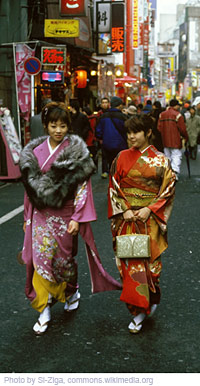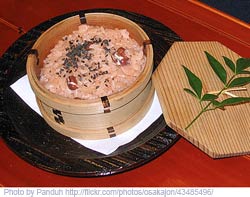The second Monday of January is the Japanese national holiday called 成人の日(せいじんのひ – seijin no hi). It seems to be translated “Adult Day” in English, and it’s correct as a direct translation. In our rules, you’re allowed to start smoking and drinking alcoholic beverages when you turn 20 years old. It’s because we regard people over 20 years old as an official adult.
 The day before 成人の日, you might notice some girls who look strange. If a girl wears ordinary clothes and has a big head wrapped with a big scarf, she may have been at a beauty salon to make her hair style match to a 着物(きもの – kimono). Lots of girls wear 着物 on 成人の日, and they have to care about their hair style. But making their hair style 日本髪 (にほんがみ – nihongami) is impossible for you unless you are a woman in Edo period (江戸時代 – えどじだい – edo jidai), so you have to visit a beauty salon. But I don’t know if even Edo women could make it by themselves…
The day before 成人の日, you might notice some girls who look strange. If a girl wears ordinary clothes and has a big head wrapped with a big scarf, she may have been at a beauty salon to make her hair style match to a 着物(きもの – kimono). Lots of girls wear 着物 on 成人の日, and they have to care about their hair style. But making their hair style 日本髪 (にほんがみ – nihongami) is impossible for you unless you are a woman in Edo period (江戸時代 – えどじだい – edo jidai), so you have to visit a beauty salon. But I don’t know if even Edo women could make it by themselves…
The morning of 成人の日, girls begin wearing kimono. Putting on a kimono is not easy, so they need help of the family or someone else, or they might go to a 美容院(びよういん – biyouin – beauty salon) so that they can be assissted with the traditional clothes and hair style. But since the morning is always too crowded to book all of the girls, many of them have to do it before the 成人の日 day. I’m wondering how they keep their beautiful hair style perfect during their sleep…
After preparations they go to 成人式(せいじんしき – seijinshiki). 成人式 is a ceremony for new adults, and it takes place at several places like comunity centers and hotels etc. Normally you go to the local place where you currently live (at least here in Sapporo), and enjoy the events there. In my case (it was over 20 years ago), after a boring speach (most of us were in our day dreams during the long formal greetings), we had photos taken, played ball games, enjoyed (and were disappointed by) a fortune telling service, talked with former classmates etc. The 成人の日 of 2008 is the 14th of January, and people who were born in 1987 (more detailedly, from 2nd of April in 1987 to 1st of April in 1988) will participate in the ceremony 成人式. You may find friends who you haven’t seen for a long time, and you might go to another party that night or possibly date. Interestingly enough, lots of girls wear Japanese traditional costumes (maybe they are arranged in a somewhat modern way), but boys rarely do it. Instead, they wear decent suits so that they look 大人(おとな – otona – adult) and can go to the parties.
 On the other hand, your family might celebrate 成人の日 at home that night or one day before. Your mother cooks lots of meals for this, and you might find a rice dish 赤飯(せきはん – sekihan) on the table. The picture to the left shows 赤飯. Here in Japan, the color 赤(あか – aka – red) is a merry color, and the pink cooked rice 赤飯 is often served in celebration at the table. By the way, apparently general 赤飯 is cooked with 小豆(あずき – azuki – red beans). Here in Hokkaido, we use bigger, sweet beans called 甘納豆(あまなっとう – amanattou), and most Japanese people are astonished by this, lol.
On the other hand, your family might celebrate 成人の日 at home that night or one day before. Your mother cooks lots of meals for this, and you might find a rice dish 赤飯(せきはん – sekihan) on the table. The picture to the left shows 赤飯. Here in Japan, the color 赤(あか – aka – red) is a merry color, and the pink cooked rice 赤飯 is often served in celebration at the table. By the way, apparently general 赤飯 is cooked with 小豆(あずき – azuki – red beans). Here in Hokkaido, we use bigger, sweet beans called 甘納豆(あまなっとう – amanattou), and most Japanese people are astonished by this, lol.
Your father might have been looking forward to enjoy drinking 酒(さけ – sake – Japanese rice wine or another alcoholic beverage) together with you (especially if you are a boy) from this special day onward. But actually you have probably already experienced Sake in secret. Anyway, lots of false adults are allowed to drink anything officially, so the town on 成人の日 might be awfully crowded.
/Shizu
ps. Please do not hesitate to write in the forum if you have any questions!
Word notes:
Both 成人(せいじん) and 大人(おとな) mean “adult”, but 大人 is much more common. Maybe 成人 is only used for some situations formally. There is also a mysterious word 社会人(しゃかいじん – shakaijin). The direct translation is “society person”, and for young people it would mean “working person”. It indicates that 社会人 is not 学生(がくせい – gakusei – student), and maybe it’s used to remind young people of their responsibility in our society. Perhaps you can hear the word 社会人 repeatedly from the news around 成人の日; Soon new 社会人 will be born… The fresh 社会人 will start their new life from that day… etc.
Vocabulary
Here’s the vocabulary from the article.
| 成人の日 | せいじんの | seijin no hi | adult day | |
| 着物 | きもの | kimono | kimono | |
| 日本髪 | にほんがみ | nihongami | Japanese hair style | |
| 江戸時代 | えどじだい | edo jidai | Edo period | |
| 美容院 | びよういん | biyouin | beauty salon | |
| 成人式 | せいじんしき | seijinshiki | Coming to age ceremony | |
| 大人 | おとな | otona | adult | |
| 赤飯 | せきはん | sekihan | a traditional japanese rice dish | |
| 赤 | あか | aka | red | |
| 小豆 | あずき | azuki | red beans | |
| 酒 | さけ | sake | Sake, a japanese rice wine | |
| 社会人 | しゃかいじん | shakaijin | a person (working) in the society | |
| 学生 | がくせい | gakusei | student |